The limits of American power
The scenes from Kabul Airport are sad and shocking, but they are not extraordinary. If anything, it seems that the Biden administration, even if they did not know what this would look like, was fully aware what they were doing - and what its consequences will be. Their allies were in it too, and they also knew what was going to happen: They were hoping, after Louis XVth, that the inevitable catastrophy would come after they have safely left.
Most of the world already knew, ever since the 'Nam, that America is much better at bombing territories than holding them. That George W still misadventured shows the perils of not knowing one's history - or for that matter, any history! There was, of course, a good dose of over-confidence from the end of history moment of the nineties: After all, as Marx said, Men make their own history, but they do not make it as they please.
It's not just about history, but also about the present. In more ways than one, what's happening in Kabul and what happened with Covid have some parallels: Looking inward has its prices! None of the world's governments have yet learned, even after 18 months living through this pandemic, that none of them would be able to solve the problem by themselves. All they tried are closing borders and hoarding supplies, playing to domestic galleries. For them, solving the problem in developing countries was a moral question, to be attended to once the more urgent business of politics has been attended to. The virus has 'learnt' faster than them and therefore, we got into a never-ending crisis. A pragmatic recognition of the irreversible connectedness of the world was missing: So it was in Kabul.
That brings me to the future. This is perhaps the befitting end of liberal internationalism, and the empire of the mind that came with it. We have seen, in Trump's tearing off the Iran nuclear deal, that Americans are unreliable treaty partners; in Biden keeping with Trump's deal with Taliban, we have seen that they are self-obsessed friends. Not many would talk about American fixing anything anymore: This would mean India's eagerness to confront China for an 'ever closer friendship' with America would cool, and the Europeans will need rethink their relationships with Russia and beyond. The end of history seems to have come to its own sad end, and we are peering at the future at Kabul.
Biden is counting on a post-Covid bump in economic sentiments backed by his reconstruction package to carry him through the next few years, long after the catastrophy at Kabul is forgotten. Indeed, who cares if either Covid or Mujahideen come for the poor people! Except that this will play a part in reconfiguring the world: The globalism that started, ironically around the same time as 9/11, would well and truly end now. Poor countries, left on their own devices, have to find their own way. Their rich would indeed cling to the responsibility-lite cosmopolitanism (and tax-nomadism) a little while longer, but we seem to be edging closer to end of that time.
So, Kabul's human tragedy - a symphony of ghosts of globalism's past, present and future - should usher in a different world, a more distracted and disconnected one, a time of breaking of empires which always accompany, and in turn, accompanied by, great human catastrophies. History is on television now if we care to switch it on.


Comments